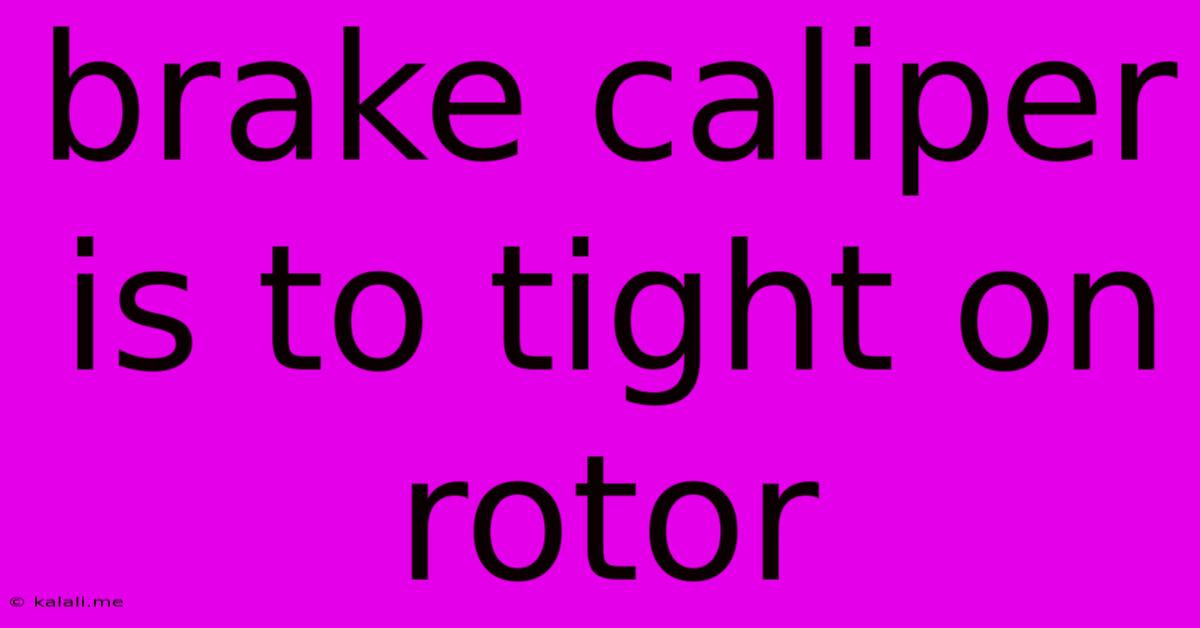Brake Caliper Is To Tight On Rotor
Kalali
Jun 08, 2025 · 4 min read

Table of Contents
Brake Caliper Too Tight on Rotor: Troubleshooting and Solutions
Meta Description: Experiencing brake caliper issues? Learn about the causes of a brake caliper being too tight on the rotor, common symptoms, troubleshooting steps, and effective solutions to get your brakes working smoothly again.
A brake caliper that's too tight on the rotor is a serious problem that can lead to reduced braking performance, uneven rotor wear, and even damage to other brake components. This article will guide you through understanding the causes, identifying the symptoms, troubleshooting the issue, and implementing solutions to restore your braking system to optimal condition.
Understanding the Problem: Why is My Brake Caliper Too Tight?
The brake caliper's job is to squeeze the brake pads against the rotor, creating friction to slow or stop the vehicle. A caliper that's too tight indicates a problem preventing it from releasing properly. This can stem from several issues:
-
Stuck Caliper Piston: This is the most common cause. The piston may be seized due to corrosion, rust, or the buildup of brake dust and debris. This prevents the caliper from retracting fully, keeping constant pressure on the rotor.
-
Worn or Damaged Caliper Seals: Damaged seals allow brake fluid to leak, leading to a loss of pressure and potentially causing the piston to stick. This often leads to a "grabbing" brake.
-
Seized Caliper Slide Pins: The caliper slides along guide pins, allowing it to move in and out as the pads wear. If these pins are seized due to corrosion or dirt, the caliper can become stuck in a closed position.
-
Bent or Damaged Caliper Bracket: A damaged caliper bracket can prevent the caliper from moving freely, leading to constant pressure on the rotor. This is less common but can cause significant problems.
-
Parking Brake Cable Issues (for rear calipers): A problem with the parking brake cable can prevent the caliper from releasing fully, especially in rear wheel calipers.
Recognizing the Symptoms: Is My Caliper Too Tight?
Several indicators suggest your brake caliper might be too tight:
-
Dragging Brakes: You might notice a persistent drag on one or more wheels, causing reduced fuel economy and excessive heat buildup.
-
Overheating Brakes: Excessive heat is a significant symptom and can be identified by the smell of burning brakes or unusually hot wheels after driving.
-
Uneven Rotor Wear: One side of the rotor may wear down more quickly than the other due to uneven pressure from the caliper.
-
Grinding or Squeaking Noises: These noises can indicate friction between the caliper and the rotor.
-
Pulled to one side while braking: This usually indicates brake problems on one side.
Troubleshooting and Solutions: Fixing the Tight Brake Caliper
Before attempting any repairs, ensure your vehicle is securely parked on a level surface, and the parking brake is engaged. Consider using jack stands for safety.
1. Inspect the Caliper: Carefully examine the caliper for any signs of damage, corrosion, or debris.
2. Check the Caliper Piston: Attempt to manually push the piston back into the caliper. If it doesn't move freely, it's likely seized.
3. Inspect the Slide Pins and Boots: Check the condition of the slide pins. If they're seized or the boots are damaged, they'll need to be replaced.
4. Inspect the Brake Pads: Check for excessive wear or damage. Replace them if necessary, as worn pads might contribute to the problem.
5. Evaluate the Brake Fluid: Low or contaminated brake fluid could also be a contributing factor.
Solutions: Depending on the cause, the solution could range from a simple cleaning and lubrication of the slide pins to a complete caliper replacement. In many cases, you may need to:
-
Clean and Lubricate the Slide Pins: Clean the pins and lubricate them with a suitable brake caliper lubricant.
-
Replace the Caliper Seals: If the seals are damaged, they will need to be replaced.
-
Replace the Caliper Piston: A seized piston usually needs to be replaced.
-
Replace the Caliper: If the caliper is severely damaged or corroded, replacement is the best solution. This is often more cost-effective than repairing a severely damaged caliper.
-
Repair or replace the parking brake cable (if applicable): If it is determined to be the problem.
Important Note: Brake repair can be complex and requires specialized tools and knowledge. If you're uncomfortable performing these repairs yourself, it's best to consult a qualified mechanic. Ignoring a tight brake caliper can lead to serious safety risks.
Latest Posts
Latest Posts
-
2005 Ford F150 Serpentine Belt Diagram
Jun 08, 2025
-
Path Of The Giant Barbarian Build
Jun 08, 2025
-
Mold On Carpet How To Clean
Jun 08, 2025
-
How To Avoid Error Sent To Console
Jun 08, 2025
-
Can T Find Dogmeat Fallout 4
Jun 08, 2025
Related Post
Thank you for visiting our website which covers about Brake Caliper Is To Tight On Rotor . We hope the information provided has been useful to you. Feel free to contact us if you have any questions or need further assistance. See you next time and don't miss to bookmark.